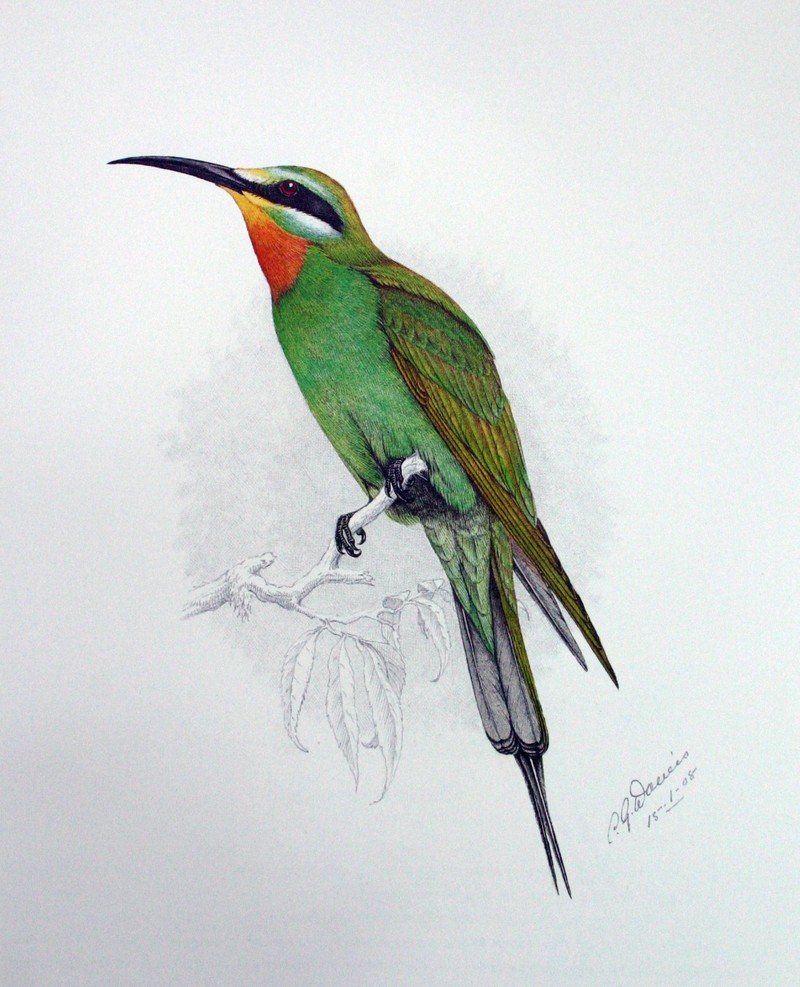|
| Query: Finch | Result: 1210th of 1287 | |
Blue-cheeked Bee-eater (Merops persicus) - Wiki
| Subject: | Blue-cheeked Bee-eater (Merops persicus) - Wiki
| |

| Resolution: 1296x1599
File Size: 468399 Bytes
Upload Date: 2007:09:10 11:57:24
|
Blue-cheeked Bee-eater
From Wikipedia, the free encyclopedia
[Photo] Blue-cheeked Bee-eater (Merops persicus) adult female. Source Transvaal Museum, Pretoria. Date 15 January 1908. Author Claude Gibney Finch-Davies (1875-1920)
The Blue-cheeked Bee-eater, Merops persicus, is a near passerine bird in the bee-eater family, Meropidae. It breeds in Morocco, Algeria, and subtropical Asia from eastern Turkey to Kazakhstan. It is strongly migratory, wintering in tropical Africa. This species occurs as a rare vagrant north of its breeding range.
This species, like other bee-eaters, is a richly-coloured, slender bird. It is predominantly green; its face has blue sides with a black eye stripe, and a yellow and brown throat; the beak is black. It can reach a length of 24-26 cm, including the two elongated central tail feathers. Sexes are alike.
This is a bird which breeds in sub-tropical semi-desert with a few trees, such as acacia. It winters in open woodland or grassland. As the name suggests, bee-eaters predominantly eat insects, especially bees, wasps and hornets, which are caught in the air by sorties from an open perch. However, this species probably takes more dragonflies than any other food item. Its preferred hunting perch is telephone wires if available.
These bee-eaters are gregarious, nesting colonially in sandy banks. They make a relatively long tunnel in which the 4 to 8, spherical white eggs are laid. Both the male and the female take care of the eggs. These birds also feed and roost communally.
The call is similar to European Bee-eater.
This species is closely related to Blue-tailed Bee-eater, M. philippinus, and was formerly considered conspecific.
http://en.wikipedia.org/wiki/Blue-cheeked_Bee-eater
| The text in this page is based on the copyrighted Wikipedia article shown in above URL. It is used under the GNU Free Documentation License. You may redistribute it, verbatim or modified, providing that you comply with the terms of the GFDL. |
|
Comments |
|---|
| | Guest |
|
Scientific Name: Merops persicus Pallas, 1773
Common Names: Blue-cheeked Bee-eater
French: Guêpier de Perse German: Blauwangenspint Spanish: Abejaruco persa
Taxonomy: Merops persica Pallas, 1773, shores of the Caspian Sea. |
^o^
Animal Pictures Archive for smart phones
^o^
|
|
|